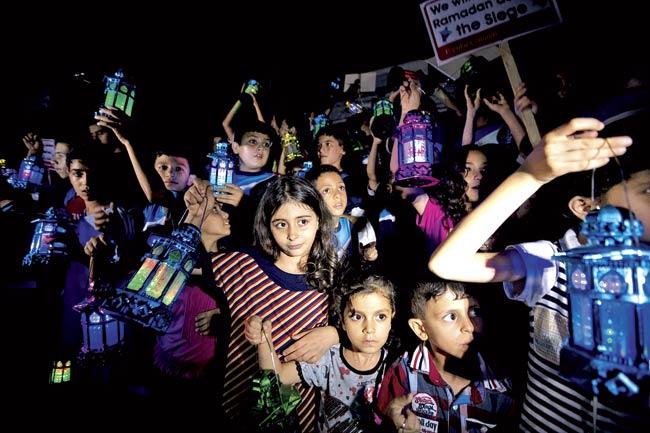From Syria to the border gates of Wagah, the fear of Balkanisation along the lines of religious radicalism and sectarianism poses a threat to the internal stability of countries of South Asia including India

 From Syria to the border gates of Wagah, the fear of Balkanisation along the lines of religious radicalism and sectarianism poses a threat to the internal stability of countries of South Asia including India.
From Syria to the border gates of Wagah, the fear of Balkanisation along the lines of religious radicalism and sectarianism poses a threat to the internal stability of countries of South Asia including India.
ADVERTISEMENT
The internal civil wars in the countries of West Asia, Afghanistan and Pakistan will test the strength of our borders, resilience of our foreign policy, grip over internal security and sectarian bonds of religion. It is one of foremost challenges that the new Indian administration faces even as it grapples with the prospect of an inadequate monsoon.
The growing ISIS reach in Iraq and the slow march towards legitimacy that the group aims to achieve is worrying for those that watch geopolitical movements in Central Asia: events that have indirect ramifications on countries with significant Muslim populations.

Palestinian children carry traditional Ramadan lanterns in Gaza city, on June 28, during a demonstration against the seige on the Gaza strip, a day before the beginning of the Muslim holy month of Ramadan. Pic/AFP
Countries like India, Indonesia and Bangladesh need to look at the effect that ISIS gains in Iraq are having on vulnerable sections of Muslim youth. Videos depicting ISIS fighters extolling the virtues of killing Iraqi army personnel further extrapolated into an ISIS versus America fight is making its way across the region... and gaining traction.
Afghanistan in the early 90s, Bosnia after that, the Intifadas in Palestine... these were events that transcended borders when it came to tangible support. Droves of Muslim youth from across the globe headed to these battle zones with the promise of adventure and holy Jihad in their minds, however, they came back radicalised and battle weary.
These are war stresses that can never be shaken off and manifests itself into new, more violent avatars... the Pakistan Taliban, Jemaah Islamiyah or the Indian Mujahideen for that matter. The threat of some Indians joining the ISIS needs to be checked before the group’s leader Abu Bakr al-Baghdadi gets any traction in the sub-continent.
The ISIS chief has already mentioned India in his recent video statement, however, the hostility that his group is engaged in is not limited to one nation any person who is not a Sunni is fair game for the ISIS merchants of death. This group not only poses a threat to India as a country but also aims at dividing Muslims across Central and South Asia.
There have been unconfirmed news reports that many Indian Shias are signing up to fight the Sunni ISIS militants in Iraq. Passports have been deposited; some may have even left for the Middle East. In countries where the youth left for jihadi wars, many came back with a radical streak. To nip this in the bud is not merely the job of law enforcement and security agencies.
Our Imams, along with community leaders and democratically elected politicians, should not limit themselves to merely denouncing ISIS from their minbars but need to actively engage their congregation about the evils that this group has already unleashed on common Iraqis and what it means if this ideology somehow divides the Muslims of India.
Even though this unconfirmed pledge by a section of the Indian Shia community to start hostilities with a group that does not pose a direct military threat to India, its residual threat to India cannot be overlooked. Any Indian fighting the ISIS militants will not be doing so to protect Iraqi people. He will be doing so to protect Shias.
The non-uniformed warriors in these war zones are being told that they are fighting the Shia-Sunni war, a bitter dispute that goes back to early Islam. Bloodletting has been going on for centuries and created and destroyed several countries. This is a fresh wave of violence sweeping across countries as religious and political power struggles intertwine and overlap.
Sectarian violence, always an ongoing affair in Pakistan, has got a fresh lease of life with the events in West Asia. ISIS’s founder Abu Musab al-Zarqawi was a member of Al Qaeda’s Pakistan chapter. He lived in Peshawar and fought in the Afghan jihad.
He ran terror camps, had close links with the terror group Lashkar-e-Jhangvi and when he was killed in an air-strike in 2006, his funeral prayers was held in absentia by a Sunni terror outfit, yes you guessed right, the Jamaat-ud-dawa.
So see the degrees of separation or coupling. Al-Qaeda ISIS Jamaat-ud-dawa Hafiz Saeed- Lashkar-e-Taiba terror strikes in India. No country is too far from the threats to its internal security from the events in West Asia. Certainly not India.
Smita Prakash is Editor, News at Asian News International. You can follow her on twitter @smitaprakash
 Subscribe today by clicking the link and stay updated with the latest news!" Click here!
Subscribe today by clicking the link and stay updated with the latest news!" Click here!






